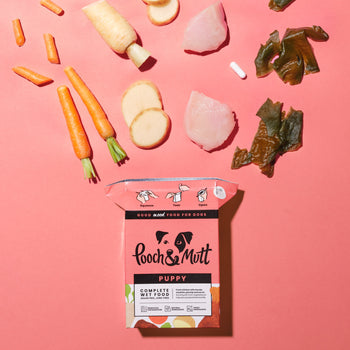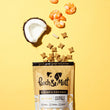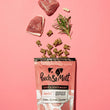
FREE UK DELIVERY ON ORDERS OVER £39.99
We know this can be a trying period of time for new puppy owners, so in this article we’ve laid out all the tips and tricks for puppy teething relief. Remember: no matter how stressful it is, you’ll one day reminisce about when your pooch was this small and hectic (no, seriously)!
Puppies’ baby teeth come in super early - from as young as two weeks. From the age of around three months, those 28 baby teeth will start to fall out for a full set of 42 adult teeth to come in. This can be painful and stressful for a puppy, just like it is for young humans to grow and lose teeth.
The most uncomfortable teething period for your pup will be from the 3-4 month mark; it might vary slightly depending on their breed. At this time, your pup’s gums will be sore and aching as baby teeth fall out and adult teeth cut in. They might be especially irritable and a bit of a handful to deal with.
Let’s go into the key signs that your puppy is well and truly teething…
Puppies are adorable, but they can be a nightmare at times - and part of that is down to teething. An increase in irritable behaviour is a main symptom that teething has started, so use this knowledge to practise some patience for your distressed pup.
One of the most challenging parts of a teething puppy’s behaviour? Chewing anything in sight! That includes table legs, the sofa, your bag or shoes, and your hands, feet and ankles.
A puppy with sore gums will drool a lot more than when they’re not teething.
A sure indication that your pooch has a sore mouth is if they’re visibly pawing at their face and snout.
When a puppy is teething, you’ll find baby teeth everywhere - stuck in chew toys, in their food bowl or even just lying about the house. This may be a shock at first, but it’s perfectly normal and actually a good sign.
Your puppy might make a lot more noise for your attention when they’re teething, specifically at night when there isn’t as much to distract them from their sore mouth.
You may see tiny blood spots on anything your pup has chewed, such as bits of towel or fabric, or even your cushions and furnishings.
A teething puppy might find it too painful to eat, and won’t be as hungry for food as you’d expect

When your poor pup is struggling with teething, it’s your job to do everything possible to make the process as pain-free as possible, and be patient with their often mad behaviour. Although in general, you’ll simply need to ride this out for a few months, there are ways to make your pup’s life (and yours!) more comfortable.
Just like with babies, the go-to method is to give your pup something to chew on to subside the pain. Be sure there are lots of toy variants on offer, ones that are specifically for teething and others that offer different textures - and rotate them. For added soothing effects, pop them in the fridge or freezer before you offer them to pup.
Some dog treats are good for teething pups, and may include ingredients to calm them and soothe pain, such as hemp or turkey. Be sure to check they’re suitable for puppies before feeding new treats or foods.
By now you’ve probably noticed - the teething stage is like a non-stop chewing festival for puppies and can be very destructive. Use this time to set boundaries with your pup, by puppy-proofing your home and teaching your pooch early training around chewing and biting (read on for more info on this).
Teething puppies will naturally bite whatever they can get their little snouts on, including your skin. Why not take advantage of this early stage of their development to teach ‘bite inhibition’? This means when they bite too hard, firmly say ‘no’. If they continue, remove yourself from their presence. When they learn to stop biting on demand, reward them with a treat. Eventually, they should learn to never bite so hard that it causes harm to other dogs or humans, even when significantly stressed (when in the vet, for instance).
Some frozen foods offer light pain relief and are distracting for puppies to chew. A carrot popped in the freezer, for instance; chopped bits of strawberry, banana or cucumber slices; or a plain, frozen bagel would keep a bitey pup entertained and relieved for a while.
If you’ve been feeding your puppy dry food, it might be worth your time to switch to wet puppy food while they’re teething. This will be much easier for them to munch on and is especially advised if you think your pup is eating less due to their aching gums.
Let’s explore some quick at-home remedies for when your dog needs distraction from their aching gums…
Carrots are great, harmless ‘chew’ foods for a teething puppy. They offer just the right consistency so your pup can munch to soothe their aching gums and potentially dislodge baby teeth, and they’re healthy, too. Popping a carrot in the freezer for a while will keep it satisfyingly cold.
As mentioned above, having lots of chewable toys on hand will distract your pup from biting your belongings, furniture, your arms and ankles! Lots of dog toys are made to be addictively chewy - others are specifically made to alleviate teething, so stock up.
Your poor pup will feel significant discomfort while teething. To reduce this pain as much as possible, try putting chew toys on rotation in the fridge or freezer; or try the ‘washcloth trick’ (see below). If your puppy is still in pain, your vet may recommend a pain relieving gel for their gums. Be sure to talk to your vet about the correct dosage, if you do use a gel.
One age-old trick you can try at home is to take a clean washcloth, soak it in water and tie it into knots - then pop it in the freezer until solid. Lay it in front of your puppy to give them plenty of teething distraction, gnawing on this homemade chew toy to their heart’s content.
Now you’re well-equipped with chew toys and nifty frozen washcloths, here are some final tips and techniques to get through this puppy teething period…
You’ll find that a puppy is never more destructive than when they’re teething. The key to avoid your skin, possessions and furniture being endlessly gnawed on is to have lots of distracting items for pup to bite instead. Stock up on chew toys, healthy treats and cold, munchable food, and your pained pooch should soon understand what they are free to chew on and what they can’t.
Of course, it’s much clearer to your dog what is ok to bite on when chewy things are readily available, and out-of-bounds items are hidden:
The goal of teething is essentially for baby teeth to fall out and make room for adult teeth. If your puppy is losing teeth but the process seems too slow, you can help it along by providing chew toys, soft puppy food or doggy dental treats, and by inspecting their teeth and gums with a finger. Don’t try to pull any teeth out manually - if you’re concerned about your puppy losing teeth too slowly, ask your vet to check them over.
Much like a baby, puppies might cry and whine overnight while teething - your poor pup will be like this for a while. You can help a teething puppy sleep by following a regular sleep schedule, maintaining a cool, calming environment for your pup, and providing them with cold chew toys just like they’d have during the day. Avoid any unnecessary overstimulation before bed. This period will seem a lot to deal with - but soon your pooch will be fully grown and you’ll miss this puppy stage! We promise!
If your pup isn’t eating because they’re teething, try mixing up their usual food to lure them back to the bowl. A puppy who eats dry food will benefit from the softness of wet food - or you could dry adding warm water or gravy to the dry food to soften it up. Make use of healthy puppy treats and frozen, chewable food, too. Get in touch with a vet if your pup still won’t eat anything.
The puppy teething period may have you pulling your hair out at times, but find solace in the fact that it only lasts a few months - and it’s an important time for your puppy to learn key skills to take into their adult dog life.
For healthy food and chews to distract your puppy from teething, try our range of puppy food and supplements. Our grain-free Puppy Wet Food is packed with nutritious whole ingredients to help your pup develop, while also being perfect for sore gums and growing teeth.
Never miss a treat!
Subscribe to our newsletter and get blog articles amongst other treats delivered to your inbox




Comments (5)
We have a three month old sprocker who is delightful most of the time but will suddenly go into biting mood and bite arms hands, in fact any part of us. This is painful, we have started shutting her into another room for a short while to calm down. This seems to work most of the time, are we doing wrong?
Hi Margaret, it certainly sounds like your pooch is in the teething stage and you are removing yourself from their presence when it gets too much. To teach ‘bite inhibition’ ensure you are firmly saying ‘no’ several times before moving them away and then when they learn to stop biting on demand, reward them with a treat. You can reach out to the team any time at [email protected] for further advice
almost 3mos.old TeddyBear Breed, 2& 1/2 lbs. He is a Kujo & draws blood when he bites, if you discipline him, he is more aggresive & barks at you. Husband does not like this at all. Breed behaviour or will this too pass?
Hi Louise,
Many puppies do go through a ‘biting’ phase and this can sometimes be due to teething or that they are trying to play. However, it you are at all concerned about aggression, we would always recommend seeking professional advice from an accredited behaviourist or trainer for further guidance as there can be many underlying causes!
We have a 20 week old Rhodesian Ridgeback pup (25kg) who has just started loosing his puppy teeth. He is now acting like he is over tired all of the time due to being uncomfortable. He has all of the chew toys and frozen cloth items but he still chews anything he can get to. When he is at his worst we just calm him down by comforting him and talking soothingly to him. It takes a while but it eventually works. He will often gently chew your hand while calming down !lol.
Leave a comment